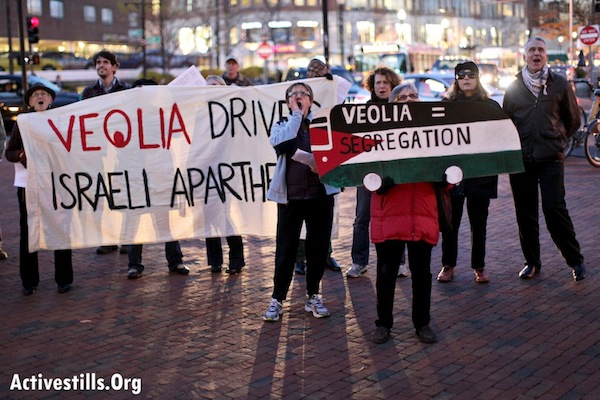Three recent divestment cases indicate that even when there are no flashy headlines, maybe especially so, boycott and divestment efforts can have a major impact where it hurts.

The largest supermarket chain in Luxembourg, Cactus, may be considering taking Israeli produce off its shelves unless suppliers can prove they do not come from occupied territory, Israeli news site Ynet reported this week.
If the chain follows through, this would be the latest in a number of related incidents that show European companies’ growing discomfort with contracts, holdings and investments in Israel. The discomfort appears rooted not in ideology or politics, but in dollars – and sense.
In June, the CEO of French telecom giant Orange stated that its brand-use contract with an Israeli mobile operator was becoming a costly political headache in France and overseas, and that he would be prefer to end the contract. His statement prompted a diplomatic incident: Prime Minister Benjamin Netanyahu lashed out at the company, and France’s foreign minister responded with fast back-peddling.
In August, another massive French company, Veolia, sold the last of its holdings in Israel after several years of phased withdrawal, according to Israeli group “Who Profits.” Veolia had been involved in a range of projects in the region, from bus lines, water and waste management, and perhaps most prominently, the Jerusalem light rail. The company has been a target of boycott activists for years due to its involvement in West Bank projects including transportation services and ownership of a landfill. Critics also charge that the light rail underserves the Palestinian population of East Jerusalem, while contributing to the de facto annexation of the eastern, Palestinian part of the city.
BDS supporters consider Veolia’s move a major victory, while Veolia completely denies any political basis for its decision. In a written statement conveyed through a spokesperson, the company told +972 Magazine that it began a strategic divestment plan in 2011, with all subsidiaries divested by August 2015, but that “[i]n no case has this divestment, or its decision, been the result of a boycott campaign or the opposition of any group whatsoever.”
However, already in 2010 rumors surfaced that Veolia sought to exit the Jerusalem light rail operations due to boycott pressure and concern that it would lose contracts elsewhere. California-based group Global Exchange has documented projects Veolia lost in recent years, claiming links to political campaigns highlighting Veolia’s Israel-Palestine activities and directed at local clients. Global Exchange estimates the combined value of such lost contracts at over $20 billion. If the number and the claim seems grandiose, Veolia’s insistence that there is no connection at all looks questionable as well.
Cactus, the Luxembourg chain, also displayed ambiguity if not actual confusion. A spokesperson for the Cactus supermarket chain told +972 Magazine she was under strict instructions not to address the issue in any way. Members of the Comité pour une Paix Juste au Proche-Orient (Committee for a Just Peace in the Middle East) who were involved in lobbying the chain told +972 Magazine it was possible the management may still change its mind. Ynet had cited a private correspondence between Cactus and the Committee stating the intention to stop selling Israeli products, but the latter declined to share or confirm it.
These incidents display the evolving nature and influence of the boycott campaign. Achievements for the movement now need not depend on changing minds but rather on changing profits. Veolia presumably made good money on its large-scale infrastructure projects in Israel in the past, but may have concluded that the financial or PR cost outweighed the profits.
In the case of both Orange and Cactus, both reportedly said that the profits from these contracts or products were not high enough anyway to justify the political fallout at home. Such companies may even be targeted as low hanging fruit for boycott activism – their divestment doesn’t involve much financial loss and therefore could be more easily achieved, while earning big PR gains for the movement.
The quiet nature of these companies’ decisions is the flip side of high-profile personal statements by celebrities such as Roger Waters and Stephen Hawking. Even when there are no flashy headlines, maybe especially so, boycott and divestment efforts can have a major impact where it hurts.
These cases could also generate concern among other European companies about similar political ramifications. In 2013, the European Union issued a set of guidelines restricting specific joint projects in the occupied territories. More technical than substantive, the guidelines nevertheless signaled that the EU was developing policies to give teeth to its rhetoric against Israel’s military occupation. Shortly afterwards, a Dutch company pulled out of an East Jerusalem project when its own government warned the activity may violate international law.
Israeli society, craving normalcy, tends to forget these troubles as long as they are not in the headlines. The news cycle is fast and each specific case quickly forgotten, perhaps even purposely downplayed.
But the possibility that these quieter incidents are the result of boycott campaigns, even indirectly, means that the potential of the movement is far from exhausted. With their potential to affect economic life in significant ways, the smaller headlines may do greater damage than big stars.
Update (Sept. 4): The Comite Pour La Paix Juste said in a press release that Cactus told them it would temporarily stop selling Israeli products.


